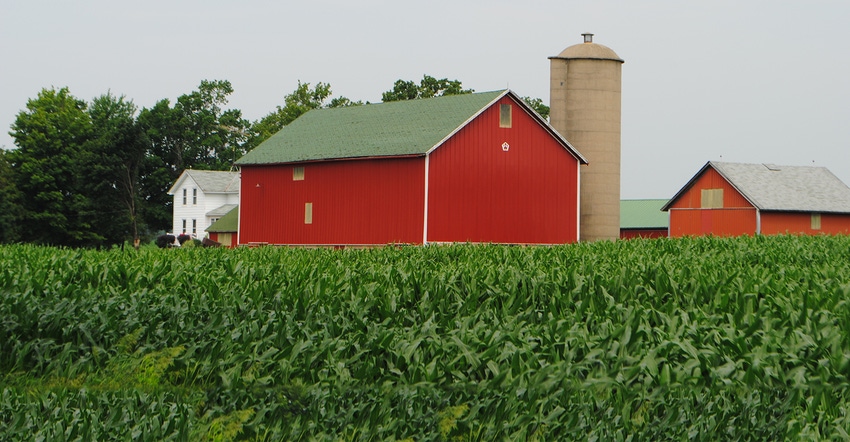September 11, 2017

By Troy Schneider
In 2017, farm incomes will drop by about 9% as a result of a multiple-year slump in farm prices. In addition, the average age of a farmer is now 58 years old. In other words, many farmers are not only getting poorer, they are also getting grayer (i.e., older). Both circumstances have led many farmers to make the decision to stop farming.
However, Uncle Sam can have a number of surprises for farmers who quit farming. The purpose of this article is to explain some of those surprises of which many farmers simply are not aware.
Surprise No. 1: Debt cancellation can be taxable. Pursuant to Section 61(a)(12) of the Internal Revenue Code, if a person’s debt is canceled or forgiven, other than as a gift or bequest, the amount forgiven is recognized as income for tax purposes. However, Section 108 of the Internal Revenue Code also creates exceptions for taxpayers to avoid recognition of such debt forgiveness income.
One important exception is for insolvent taxpayers. Specifically, a taxpayer can exclude canceled debt from gross income up to the amount he or she is insolvent. An example would be as follows: Assume Joe’s total liabilities before any debt cancellation were $10,000, and his total assets had a fair market value of $7,000. Joe is insolvent by $3,000. If $5,000 of Joe’s entire debts were forgiven, he would still have to recognize $2,000 of canceled debt income ($5,000 debt forgiveness less the $3,000 insolvency amount).
If Joe was a farmer, the $2,000 of canceled debt income might also be subject to qualified farm debt rules. In other words, a farm may also exclude cancellation of qualified farm debt as income. However, there still may be income to recognize if the amount of the canceled farm debt exceeds the farmer’s remaining tax basis in farm assets.
Surprise No. 2: All farm assets are not taxed equally. Farmers who are selling their farms are surprised to learn of the various ways their farm assets are taxed. Here are a few:
• Federal ordinary income tax — rates up to 39.6%, depending on taxable income
• Federal capital gains tax — rates of 0%, 15% or 20%, depending on taxable income
• Depreciation recapture — 25% on real estate or at ordinary income tax rates; depreciation recapture is the IRS’ way to tax depreciation previously taken
How a farmer allocates the sale price of farm assets will often determine the type of tax the farmer ultimately pays.
Surprise No. 3: Receiving installment payments can reduce taxes. Bare land is considered a capital asset. A sale of a capital asset is taxed at the 0%, 15% or 20% tax rates, depending upon the taxpayer’s regular tax bracket for the year. Therefore, if a taxpayer’s regular tax bracket is 15% or less, his or her capital gains rate is 0%; if a taxpayer’s regular tax bracket is 25% to 35%, his or her capital gains rate is 15%; and if a taxpayer’s regular tax bracket is 39.6%, his or her capital gains rate is 20%. Installment sales of land can reduce a farmer’s tax burden by spreading the income over years where it is taxed in lower tax brackets.
An example would be as follows: Assume Joe sold farmland to his son Jim by them signing a note and mortgage for $500,000. Joe receives annual payments of $25,000 (a portion is principal and a portion is interest) until the note is paid. If Joe has no other taxable income, the principal portion of each $25,000 payment would likely fall into the 10% and 15% income tax brackets, and would therefore qualify for the 0% capital gains rate. Joe would still, however, have to report the interest portion of each payment as ordinary income.
Surprise No. 4: Being generous to your farm successor after you die can create taxes. Income in respect of a decedent (IRD) is income a deceased person was entitled to receive at the time of his or her death. The deceased person’s estate, beneficiary or heir who receives IRD must include it as his or her taxable income. The basis in property that is IRD does not receive “stepped-up basis” at the time of death. Cancellation of someone’s debt that was not previously taxed to the decedent may be considered IRD.
An example would be as follows: Assume Joe sold farmland to his son Jim by them signing a note and mortgage for $500,000. Joe dies three years later, and at the time of his death, Jim still has $300,000 to pay on the note. Joe’s will provides that the entire amount Jim owes him at the time of his death is canceled. Because Joe’s will cancels the remaining payments, his estate is treated as receiving the remaining payments at the time of his death. Joe’s estate must report the remaining payments on the estate’s income tax return.
These tax surprises are only a few of the many that exist for the farmer getting out of farming. Qualified tax advice should always be obtained during such an event. Many strategies exist that can reduce taxes while still following the letter of the tax laws found in the Internal Revenue Code. After they leave the farm, farmers generally hate surprises — they had enough of them while farming.
Schneider is a partner in the Chilton ag law firm Twohig, Reitbrock, Schneider and Halbach S.C. To contact Schneider, call 920-849-4999.

Troy Schneider
You May Also Like




